April 18, 2025 | 00:45 GMT +7
April 18, 2025 | 00:45 GMT +7
Hotline: 0913.378.918
April 18, 2025 | 00:45 GMT +7
Hotline: 0913.378.918
Nguyen Dac Hung, a mango grower in Bai Gieng residential group 1 (Cam Duc town, Cam Lam district, Khanh Hoa province) said that farmers in the district have entered the main Australian mango harvest since early March this year. However, due to the high costs of fertilizers and pesticides, farmers neglect their crops and do not care about them making the yield this year decrease sharply compared to previous years.
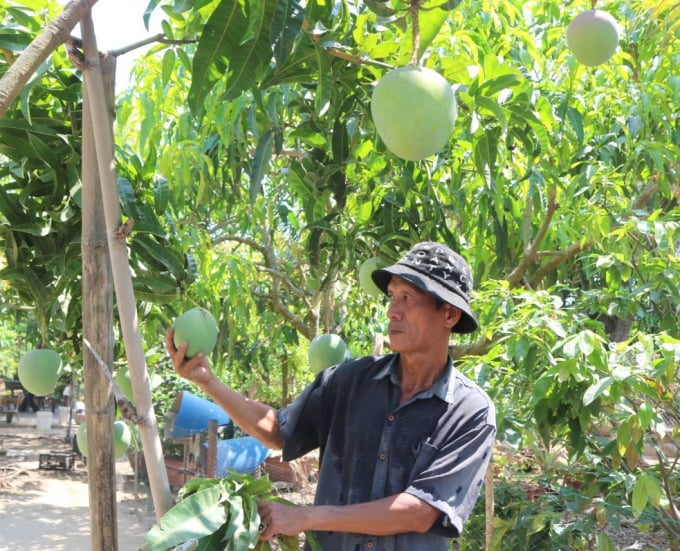
In the main Australian mango crop 2022, farmers say high investment costs have forced them to neglect many areas so the yield is very low. Photo: KS.
Accordingly, if farmers pay attention to care for the crop as they do every year, 1ha of Australian mango can give a stable yield of 10-12 tons on average. However, this year, a majority of mango orchards have a low yield, averaging only 7-8 tons/ha.
In terms of price, Australian mangoes were sold at over VND20,000/kg at the beginning of the season due to scarcity but now, at the time of harvest, their price is continuously dropping week by week and now stands only at VND6,000-7,000/kg. With this price, farmers will definitely face losses because they can't afford harvesting and transportation.
"In this mango crop, costs for fertilizers and pesticides have increased on an average of about VND50 million or more per 1ha while the selling price is low, thus most of the farmers are facing losses," Hung complained.
According to Hung, his family has 2ha of mangoes, of which 1ha is the land hired at about VND30 million/year. Thanks to good care, his family's mango garden yielded nearly 10 tons. Due to a good selling price of VND10,000/kg at the beginning of the harvest, he could cover part of the investment capital. However, for 1ha of rented land, it was a complete failure since the mangoes were damaged a lot thus they were sold at low prices. The family has faced heavy losses.
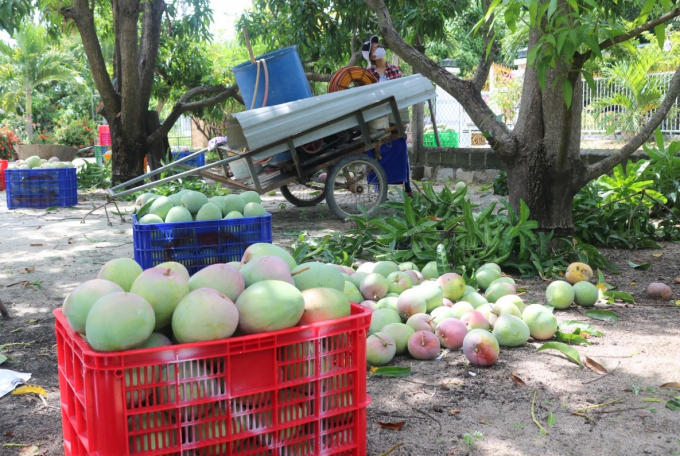
The Australian mango "capital" in Cam Lam district (Khanh Hoa) this year faces a 'gloomy' harvest. Photo: KS.
Mr. Nguyen Van Khiem, owner of Kim Thao mango granary in Suoi Tan and Cam Hiep Bac communes (Cam Lam district) also said most of the growers had not paid much attention to care for the crop, along with the impacts of rainy weather so the yield and quality of mangoes have decreased.
This year, the yield of Australian mangoes has reduced to 50% compared to last year. Half a month ago, the price of mango stood at over VND10,000/kg and farmers harvested to sell to the barn. However, at present, the price has decreased to only VND6,000-7,000/kg, so many of them give up and do not want to harvest.
“Currently, if the mango garden is still good, growers can still harvest, but if it is bad, they do not care. Because with the current low price, hiring workers to harvest and transport may cost more than profit," said Mr. Khiem.
Regarding the sharp drop in mango prices, according to Khiem, along with high transportation costs caused by rising oil prices, the export of Australian mangoes to China (the main consumption market) faces difficulties because this country is implementing a policy called "Zero Covid-19". Therefore, Australian mangoes are now mainly consumed domestically in areas from Khanh Hoa province to the North.
According to the Department of Agriculture and Rural Development (DARD) of Cam Lam district, the locality currently has over 5,000ha of mangoes, most of which are Australian ones but only 1,400ha (equivalent to 40% of the area of the same period in previous years), can give fruits with a total output estimated at 8,400 tons.
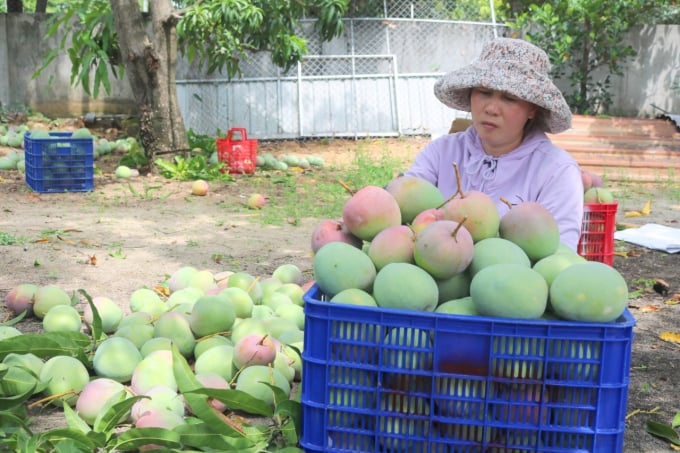
Not only farmers but also traders are upset about the mango price drop. Photo: KS.
In addition to the sadness of crop failure and devaluation, mangoes at harvest are also strongly affected by pests (fruit flies), especially after the recent unseasonal rains that give them more convenience to lay eggs on mangoes, causing spoilage for lots of fruits.
As the mango is already in the harvest period, the use of pesticides to prevent fruit flies is not possible due to the problem of food safety and hygiene. Therefore, the DARD office in collaboration with the Plantation and Plant Protection Station of Cam Lam district has guided farmers to implement safe control measures.
For mango consumption, the DARD office has coordinated with localities to recommend people regularly visit gardens, collect mangoes that have reached the harvest period to avoid fruit drops, and prevent pests, especially fruit flies from hitting the plants.
The DARD office of Cam Lam district is also advising the district People's Committee to coordinate with the DARD in setting up a plan to hold a conference on promoting, guiding, developing and managing mango growing area codes with the aim to develop rowing codes for all mango areas and packing codes for purchasing and preliminary processing units in the district with an orientation towards official and sustainable mango exports.
Along with that, it recommends people and businesses to set up production-consumption linkage chains to limit the mango growing fragmentation, promote people to apply new technological advances to production, carry out safe production according to VietGAP standards and support mango purchasing and processing units to reduce the pressure of consuming fresh mangoes during the main harvest season.
Translated by Linh Nguyen
/2025/04/17/0439-0-093912_377.jpg)
(VAN) Following the U.S. Government's decision to temporarily postpone the imposition of reciprocal tariffs, coffee prices have continuously increased sharply and are expected to continue rising in the near future.
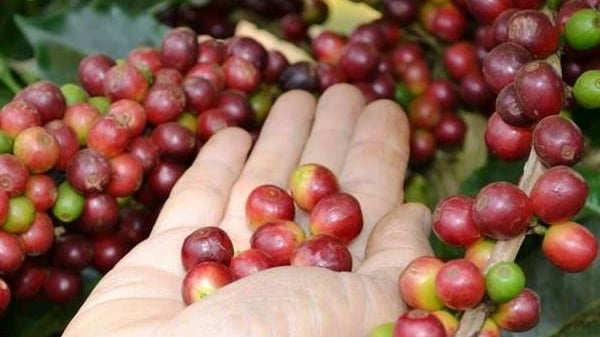
(VAN) Coffee prices on April 17, 2025, maintain their upward momentum. Domestic prices rose by VND 1,600, reaching the range of VND 132,600–133,600/kg.
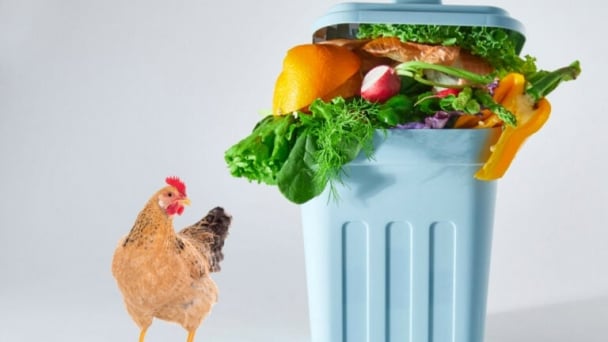
(VAN) Discussions are underway in Egypt on how to recycle millions of tonnes of agricultural and food waste into animal feed.
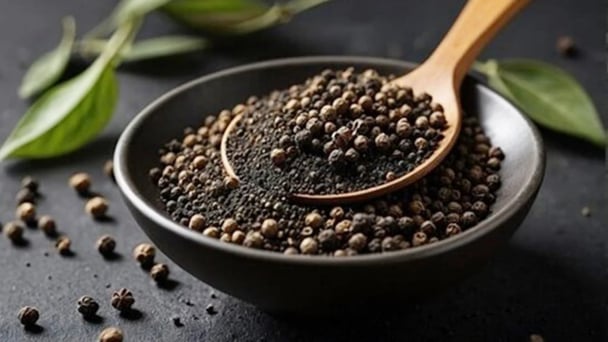
(VAN) Pepper prices on April 16, 2025, saw little fluctuation. Domestic pepper prices rose by as much as VND 1,500, trading around VND 155,500–158,000/kg.

(VAN) Coffee prices on April 16, 2025, continue a strong upward trend globally. Domestic prices rise by VND 5,000–5,200, reaching VND 131,300–132,200/kg.
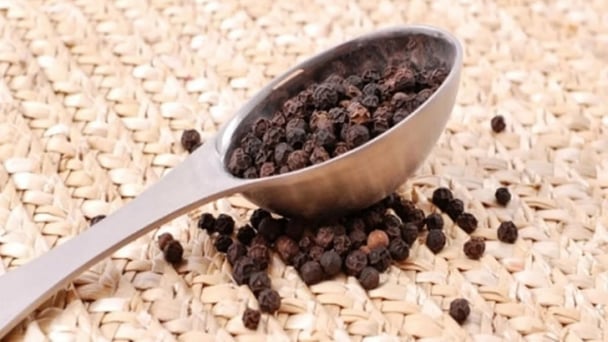
(VAN) Pepper prices on April 15, 2025: Global market sees mixed fluctuations, while domestic prices remain stable, trading around VND 154,000 - 157,000/kg.

(VAN) Coffee prices on April 15, 2025, have surged globally. Domestic coffee prices rose by VND 2,600, reaching the range of VND 126,300 - 127,200/kg.